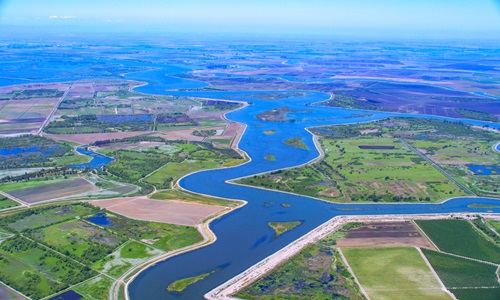Regional Conservation Investment Strategy

Aerial view looking north at left to right Mandeville Island, Middle River and Medford Island all are part of the Sacramento-San Joaquin River Delta in San Joaquin County, California. Photo taken May 11, 2023.
Sacramento-San Joaquin River Delta Regional Conservation Investment Strategy
DWR’s Delta Levees Program is developing a Regional Conservation Investment Strategy (RCIS) for the Sacramento–San Joaquin River Delta (Delta). The proposed Delta RCIS would provide a roadmap for conservation actions, integrating existing regional conservation priorities and strategies to help guide investments and infrastructure planning and advance mitigation opportunities in the Delta.
This RCIS will recommend and prioritize conservation actions to address concerns such as flood damage from sea level rise, more frequent and severe storms, and climate change in the region. It will specifically address the four habitat types regulated by California Department of Fish and Wildlife’s Delta Levees Program: riparian forest, scrub-shrub, shaded riverine aquatic, and freshwater marsh (Water Code Sections 12314 and 12987). Additionally, the proposed RCIS will evaluate focal and non-focal species as well as other key conservation elements identified with input from a Steering Committee. Focal species are sensitive species identified and analyzed within an RCIS that will benefit from conservation actions and/or habitat enhancement actions set forth in the RCIS. Non-focal species are species that are associated with a focal species or other conservation element in an RCIS due to shared ecological needs and requirements and could benefit from implementation of conservation actions and or habitat enhancement actions for the associated focal species or other conservation element.
The goals of the Delta RCIS are:
- Identify high-priority areas for habitat restoration, such as wetlands and floodplains, and recommend restoration techniques and enhancement projects.
- Apply science-based approaches to conservation by using data and analysis to guide decision making.
- Safeguard ecosystems and wildlife against climate change by identifying conservation actions that increase the region’s resilience.
- Foster collaborative conservation efforts by engaging with local interested parties including conservation nonprofits, landowners, California Native American Tribes, local governments, and the general public.
Public input will be integral to the development of the Delta RCIS. You can find opportunities to engage and provide feedback by checking the Events page.
Contact Us to get involved in the Delta RCIS
The Delta RCIS is being drafted, and your input is invaluable to the process. Contact us to see how you can get involved!
An RCIS provides guidance for priority conservation and habitat enhancement. It does not create, modify, or impose regulatory requirements or standards. It does not regulate land use, establish land use designations, or affect land use authority.
An approved RCIS will enable DWR to:
- Prepare a Mitigation Credit Agreement (MCA) to generate advanced mitigation credits.
- Use MCA-created credits to mitigate impacts from DWR projects and programs. For example, MCA credits will be used to address participant mitigation needs for DWR’s Delta Levees Program.
- Identify potential conservation projects.
- Provide DWR and other interested parties with the opportunity to integrate Delta conservation priorities in future projects.
An RCIS benefits interested communities by providing opportunities to enhance the long-term resilience of native species, habitat, and natural resources, including:
- Identifying wildlife and habitat conservation priorities, including actions to address climate change impacts and other wildlife stressors.
- Identifying areas that can provide compensatory mitigation for impacts to species and natural resources.
The RCIS can also benefit people and wildlife in the Delta by providing mitigation credits to implement conservation and habitat enhancement actions. It can also help communities qualify for state or local conservation grant funding for implementing land restoration.
Additional resources are available on CDFW’s RCIS program website. For further information, please contact DWR at DeltaRCIS@water.ca.gov.
Events
Tribal Webinar, Part 1
Start: August 27th 9AM
End: August 27th 10:30AM
Tribal Webinar, Part 2
Start: October 22nd 9AM
End: October 22nd 10:30AM
If you are a tribal member and would like to attend, please contact us at DeltaRCIS@water.ca.gov.
